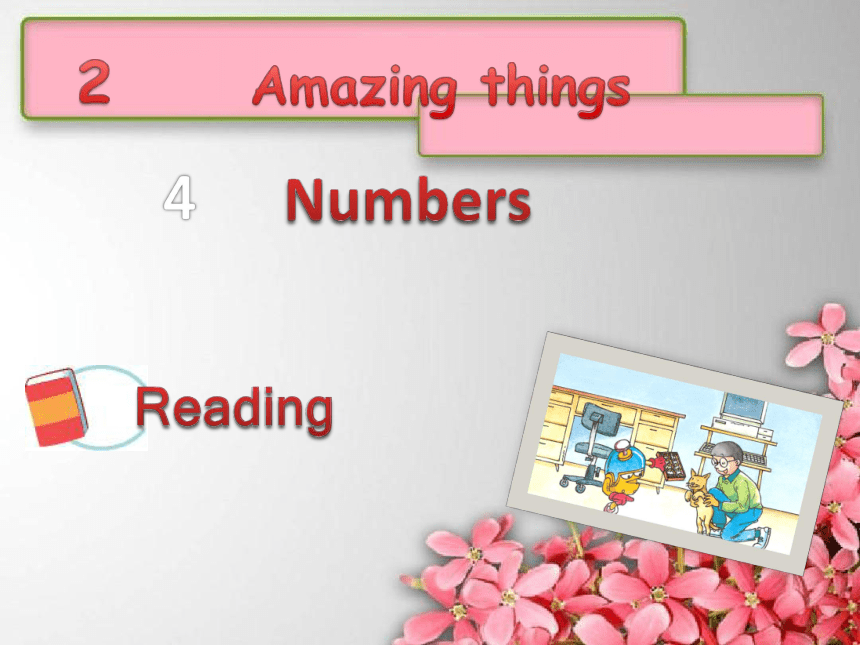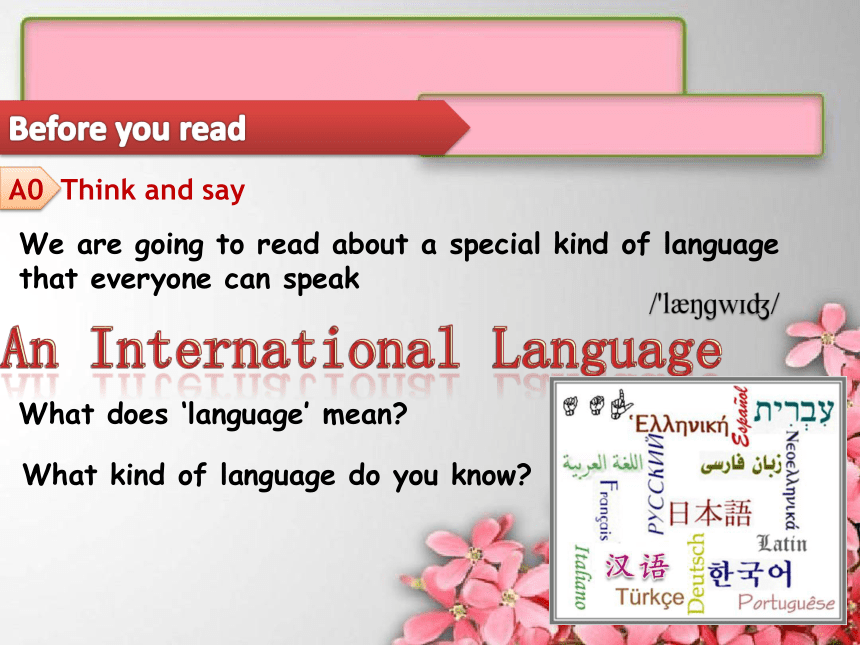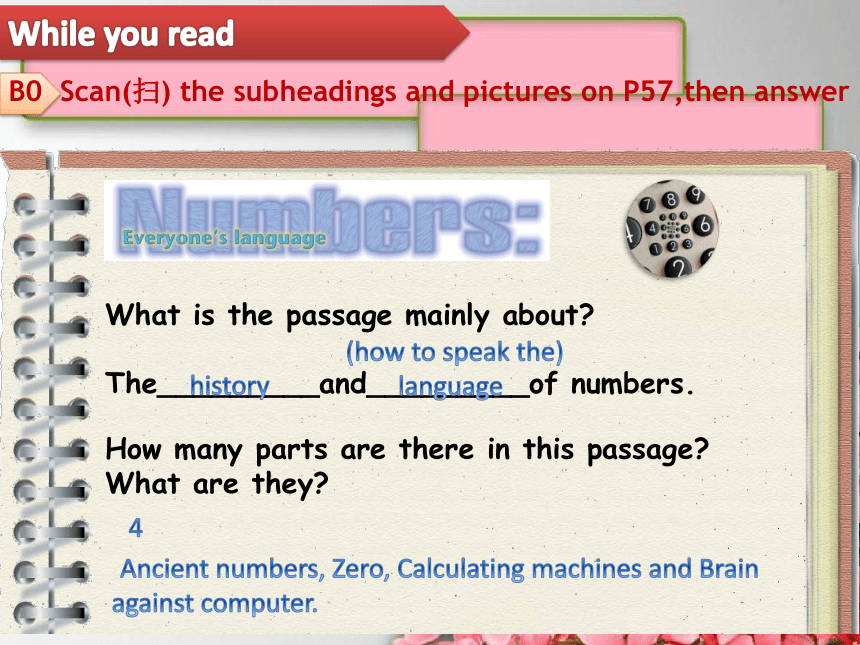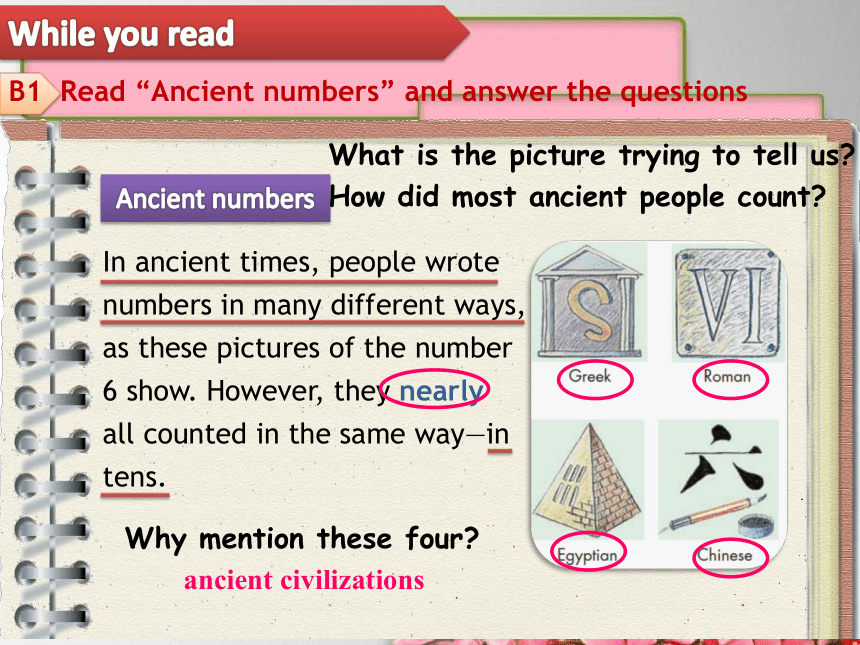Unit 4 Numbers Reading 课件(共19张PPT)
文档属性
| 名称 | Unit 4 Numbers Reading 课件(共19张PPT) |

|
|
| 格式 | pptx | ||
| 文件大小 | 5.8MB | ||
| 资源类型 | 教案 | ||
| 版本资源 | 牛津上海版(试用本) | ||
| 科目 | 英语 | ||
| 更新时间 | 2023-09-12 13:59:08 | ||
图片预览







文档简介
(共19张PPT)
2
4
Amazing things
Numbers
Reading
Before you read
A0 Think and say
We are going to read about a special kind of language that everyone can speak
An International Language
/'l ɡw /
What does ‘language’ mean
What kind of language do you know
Before you read
A1 Think about what these numbers stand for(代表).
200092
3.1415
1.414
404
119
13
-a zip code
-π
-the square root of 2()
-not found
-emergency number
-unlucky number
To calculate the area of a circle
/ k lkjule t/
What do we use it to do
/ m d nsi/
Before you read
A2 Read the title and the introduction,answer the questions.
How many languages do you know Everyone knows at least two—his or her own language and the international language of numbers.
What is the title
What will the writer probably talk about in the passage
Numbers: Everyone's language
While you read
B0 Scan(扫) the subheadings and pictures on P57,then answer
What is the passage mainly about
The_________and_________of numbers.
How many parts are there in this passage What are they
history
(how to speak the) language
4
Ancient numbers, Zero, Calculating machines and Brain against computer.
While you read
B1 Read “Ancient numbers”, tell the meanings of the picture
In ancient times, people wrote numbers in many different ways, as these pictures of the number 6 show. However, they nearly all counted in the same way—in tens.
Ancient numbers
Why mention these four
ancient civilizations
How did most ancient people count
While you read
B1 Read “Ancient numbers” and answer the questions
In ancient times, people wrote numbers in many different ways, as these pictures of the number 6 show. However, they nearly all counted in the same way—in tens.
Ancient numbers
Why mention these four
ancient civilizations
What is the picture trying to tell us
How did most ancient people count
While you read
B1 Read “Ancient numbers” and answer the questions
Can you think of any exceptions
Is there any civilization that doesn't count in tens
Why did most ancient people count in tens
What does this paragraph tell us
Ancient people write the numbers in different ways but count them in the same way
have different number writing systems
but the same counting system.
/ s st m/
a group of things that work together
Zero
Most of us use the system of numbers with numbers from 1 to 9 and 0 (zero). With these ten numbers, we can write any number from the biggest to the smallest. The Indians first invented and developed the 1 to 9 system of numbers. They then invented the zero. This was a very important invention because it made it easier to write big numbers and to calculate.
While you read
B2 Read “Zero” and answer the questions
What’s the system of numbers most people use today
Who played an important role in creating the system
Why was "zero” very important
While you read
B2 Read “Zero” and answer the questions
What was the process
What’s the system of numbers most people use today
Who played an important role in creating the system
Why was "zero” very important
The system of numbers with numbers from 1 to 9 and 0.
The Indians.
Because it made it easier to write big numbers and to calculate.
The usage and the inventor of zero.
What does this part tell us
They first invented and developed the 1 to 9 system of numbers and then invented zero
/ n vent/
/d vel p/
While you read
B3 Read “Calculating machines”,list the machines and their advantages.
Calculating machines
One of the first calculating machines was an abacus. Abacuses are so fast and accurate that people still use them today.
A modern electronic calculator can add, subtract, multiply and divide. It can also calculate percentages and square roots.
Computers are very powerful calculating machines. In a flash, a computer can do a calculation that you could not do in your whole lifetime.
While you read
B3 Read “Calculating machines”,list the machines and their advantages.
Calculating machines Advantages
abacus
/ b k s/
electronic / lek tr n k/
calculator
/ k lkjule t (r)/
computer
fast and accurate
do all kinds of calculations
/ k lkju le ( )n/
powerful
/ kj r t/
exactly right; with no mistakes.
In a flash, it can do a calculation that you could not do in your whole liShrne.
While you read
B4
Find the number tha when it is multiplied 23 times by itself, gives this answer: 916748676920039158098660927585380162483106680144308622407126516427934657040867096593279205767480806790022783016354924852380335745316935111903596577547340075681688305620821016129132845546805780158806771
used when we are comparing two things
or two things are competing with each other
/ ɡenst/
Brain against computer
versus(vs.)
multiply
/'m lt pla /
Brain against computer
Some people call the brain a living computer. Is a human brain a more powerful calculator than a computer The following story may give an answer.
Shakuntala Devi is a lady from India with an amazing brain. Shakuntala and a very powerful computer were given this problem to solve.Shakuntala’s brain took fifty seconds to find the answer, like lightning. The computer took a minute. However, someone had to first program the computer with instructions, and that took many hours. No one had to program Shakuntala!
Use your own living computer to solve the problem above. If it is not powerful enough, you will find the answer on page 67.
While you read
B4 Read “Brain against plete the table.
Competetior How long it took to get the answer
While you read
B4 Read “Brain against plete the table.
Competetior How long it took to get the answer
Shakuntala
Computer
Who was the winner of the competition
fifty seconds
one minute
like lightning
/ la tn /
many hours to program
/'pr ɡr m/
give a computer, etc. a set of instructions to make it perform a particular task
What do you think of her brain
amazing
/ me z /
What can we conclude from this part
Human brains have an advantage over computers—no need for programming.
0
After you read
C0 Name the pictures properly and put them on the right place of the line accoring to the passage
0
Ancient numbers
Zero
Calculating machines
Brain against computer
After you read
C0 Name the pictures properly and put them on the right place of the line accoring to the passage
origin
(起源)
development
tool
competition
After you read
C1 Read the following questions and divide.
Did people count numbers in the same way long ago
How widely are numbers used in different fields around the world
Was the system of numbers in the past different from the one we use today
How do people do calculations
Do the numbers in different countries always look the same
Why do people see numbers as an international language
How do numbers help people to communicate with each other better
What are the examples of numbers being used in the same way around the world
Which of the questions above has been answered in the article
Which hasn't been answered
Which can be inferred (推测)from the article
(if you can,give your reason)
After you read
C1 Read the following questions and divide.
Did people count numbers in the same way long ago
How widely are numbers used in different fields around the world
Was the system of numbers in the past different from the one we use today
How do people do calculations
Do the numbers in different countries always look the same
Why do people see numbers as an international language
How do numbers help people to communicate with each other better
What are the examples of numbers being used in the same way around the world
×
Most of us use the system of numbers with the numbers 1 to 9 and 0
Pictures
×
×
Are all the answered questions closely related to the title “Numbers: Everyone's language”
2
4
Amazing things
Numbers
Reading
Before you read
A0 Think and say
We are going to read about a special kind of language that everyone can speak
An International Language
/'l ɡw /
What does ‘language’ mean
What kind of language do you know
Before you read
A1 Think about what these numbers stand for(代表).
200092
3.1415
1.414
404
119
13
-a zip code
-π
-the square root of 2()
-not found
-emergency number
-unlucky number
To calculate the area of a circle
/ k lkjule t/
What do we use it to do
/ m d nsi/
Before you read
A2 Read the title and the introduction,answer the questions.
How many languages do you know Everyone knows at least two—his or her own language and the international language of numbers.
What is the title
What will the writer probably talk about in the passage
Numbers: Everyone's language
While you read
B0 Scan(扫) the subheadings and pictures on P57,then answer
What is the passage mainly about
The_________and_________of numbers.
How many parts are there in this passage What are they
history
(how to speak the) language
4
Ancient numbers, Zero, Calculating machines and Brain against computer.
While you read
B1 Read “Ancient numbers”, tell the meanings of the picture
In ancient times, people wrote numbers in many different ways, as these pictures of the number 6 show. However, they nearly all counted in the same way—in tens.
Ancient numbers
Why mention these four
ancient civilizations
How did most ancient people count
While you read
B1 Read “Ancient numbers” and answer the questions
In ancient times, people wrote numbers in many different ways, as these pictures of the number 6 show. However, they nearly all counted in the same way—in tens.
Ancient numbers
Why mention these four
ancient civilizations
What is the picture trying to tell us
How did most ancient people count
While you read
B1 Read “Ancient numbers” and answer the questions
Can you think of any exceptions
Is there any civilization that doesn't count in tens
Why did most ancient people count in tens
What does this paragraph tell us
Ancient people write the numbers in different ways but count them in the same way
have different number writing systems
but the same counting system.
/ s st m/
a group of things that work together
Zero
Most of us use the system of numbers with numbers from 1 to 9 and 0 (zero). With these ten numbers, we can write any number from the biggest to the smallest. The Indians first invented and developed the 1 to 9 system of numbers. They then invented the zero. This was a very important invention because it made it easier to write big numbers and to calculate.
While you read
B2 Read “Zero” and answer the questions
What’s the system of numbers most people use today
Who played an important role in creating the system
Why was "zero” very important
While you read
B2 Read “Zero” and answer the questions
What was the process
What’s the system of numbers most people use today
Who played an important role in creating the system
Why was "zero” very important
The system of numbers with numbers from 1 to 9 and 0.
The Indians.
Because it made it easier to write big numbers and to calculate.
The usage and the inventor of zero.
What does this part tell us
They first invented and developed the 1 to 9 system of numbers and then invented zero
/ n vent/
/d vel p/
While you read
B3 Read “Calculating machines”,list the machines and their advantages.
Calculating machines
One of the first calculating machines was an abacus. Abacuses are so fast and accurate that people still use them today.
A modern electronic calculator can add, subtract, multiply and divide. It can also calculate percentages and square roots.
Computers are very powerful calculating machines. In a flash, a computer can do a calculation that you could not do in your whole lifetime.
While you read
B3 Read “Calculating machines”,list the machines and their advantages.
Calculating machines Advantages
abacus
/ b k s/
electronic / lek tr n k/
calculator
/ k lkjule t (r)/
computer
fast and accurate
do all kinds of calculations
/ k lkju le ( )n/
powerful
/ kj r t/
exactly right; with no mistakes.
In a flash, it can do a calculation that you could not do in your whole liShrne.
While you read
B4
Find the number tha when it is multiplied 23 times by itself, gives this answer: 916748676920039158098660927585380162483106680144308622407126516427934657040867096593279205767480806790022783016354924852380335745316935111903596577547340075681688305620821016129132845546805780158806771
used when we are comparing two things
or two things are competing with each other
/ ɡenst/
Brain against computer
versus(vs.)
multiply
/'m lt pla /
Brain against computer
Some people call the brain a living computer. Is a human brain a more powerful calculator than a computer The following story may give an answer.
Shakuntala Devi is a lady from India with an amazing brain. Shakuntala and a very powerful computer were given this problem to solve.Shakuntala’s brain took fifty seconds to find the answer, like lightning. The computer took a minute. However, someone had to first program the computer with instructions, and that took many hours. No one had to program Shakuntala!
Use your own living computer to solve the problem above. If it is not powerful enough, you will find the answer on page 67.
While you read
B4 Read “Brain against plete the table.
Competetior How long it took to get the answer
While you read
B4 Read “Brain against plete the table.
Competetior How long it took to get the answer
Shakuntala
Computer
Who was the winner of the competition
fifty seconds
one minute
like lightning
/ la tn /
many hours to program
/'pr ɡr m/
give a computer, etc. a set of instructions to make it perform a particular task
What do you think of her brain
amazing
/ me z /
What can we conclude from this part
Human brains have an advantage over computers—no need for programming.
0
After you read
C0 Name the pictures properly and put them on the right place of the line accoring to the passage
0
Ancient numbers
Zero
Calculating machines
Brain against computer
After you read
C0 Name the pictures properly and put them on the right place of the line accoring to the passage
origin
(起源)
development
tool
competition
After you read
C1 Read the following questions and divide.
Did people count numbers in the same way long ago
How widely are numbers used in different fields around the world
Was the system of numbers in the past different from the one we use today
How do people do calculations
Do the numbers in different countries always look the same
Why do people see numbers as an international language
How do numbers help people to communicate with each other better
What are the examples of numbers being used in the same way around the world
Which of the questions above has been answered in the article
Which hasn't been answered
Which can be inferred (推测)from the article
(if you can,give your reason)
After you read
C1 Read the following questions and divide.
Did people count numbers in the same way long ago
How widely are numbers used in different fields around the world
Was the system of numbers in the past different from the one we use today
How do people do calculations
Do the numbers in different countries always look the same
Why do people see numbers as an international language
How do numbers help people to communicate with each other better
What are the examples of numbers being used in the same way around the world
×
Most of us use the system of numbers with the numbers 1 to 9 and 0
Pictures
×
×
Are all the answered questions closely related to the title “Numbers: Everyone's language”
